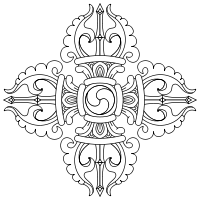Ngöndro means preliminary practices
The first is taking refuge, which is done through prostrations.
The second is the practice of Vajrasattva.
The third is the mandala offering.
And the fourth is the Guru Yoga practice.
One of the most important aspects of these foundational practices is purification—they are purificatory practices.
Especially the first two—prostrations and Vajrasattva—are very powerful methods of purification.
Ngöndro is divided into two categories:
the four common and the four special preliminary practices.
The four common preliminary practices are contemplations—four fundamental reflections that turn the mind toward the Dharma.

The first is the contemplation on the precious human body.
We reflect and meditate on the uniqueness and rarity of our precious human life.
The second contemplation is on impermanence.
We reflect on how easy it is to lose this precious human body. Everything is impermanent—most of all, our own life.
Once we are born, death is absolutely certain. Death, which inevitably comes to all of us, is one of the most frightening things we face. And yet, no matter how fearful it may be, we cannot avoid it—it will come without fail.
As human beings, we must face this truth. Not only humans die—even the Buddhas pass away. We know that Buddhas possess immense power and capabilities, yet even they cannot escape death.
By contemplating and meditating on this, we come to understand that at the moment of death, we go on completely alone. Everything must be left behind.
What we can take with us—what can truly help us—is the Dharma.
Reflecting deeply on impermanence leads us to the understanding that the most important thing in this life, and beyond it, is the practice of the Dharma.
The third foundational reflection is on karma.
There is positive karma and negative karma. Positive karma arises from virtuous actions—actions of body, speech, or mind. Good actions bring good results; harmful actions bring suffering.
Therefore, we must pay close attention to the actions we perform, because every deed is followed by its result—its karmic consequence.
It is also very important to understand that karma is individual—everyone has their own personal karma. This means we must be very mindful of our own conduct.
How our next life will unfold is determined by the actions we have performed in this life and in previous ones.
If we wish for a good future life, we should perform wholesome actions and live with a kind heart.
Positive karma also arises from acts of grace and generosity. So let us cultivate positivity, love, and compassion toward all sentient beings
The fourth common preliminary practice is the contemplation on the suffering of cyclic existence, or samsara.
It refers to the endless cycle of birth and death in which we continuously revolve—again and again—without true freedom.
All beings in the six realms are caught in this cycle:
the hell realms, the realm of hungry ghosts, the animal realm, the human realm, the realm of demi-gods, and the god realms.
Each of these six realms is marked by suffering. All sentient beings—regardless of the realm they inhabit—experience suffering in various forms.
As long as we remain within this cycle of existence, suffering will persist.
We may think that there is happiness in worldly life—and there is—but it is temporary. It always comes to an end, and ultimately leads back to suffering.
This is why samsara is described as being fundamentally unsatisfactory. The only true way out is through enlightenment.
Contemplating deeply on this fourth thought awakens the determination to practice the Dharma, which is the path that leads to liberation from the cycle of suffering.
These are the Four Common Preliminary Practices, also known as the Four Thoughts That Turn the Mind Toward the Dharma.

We keep you informed about empowerments, teachings, and more. We also offer opportunities for discounted early-bird tickets! Don’t miss out — subscribe now!